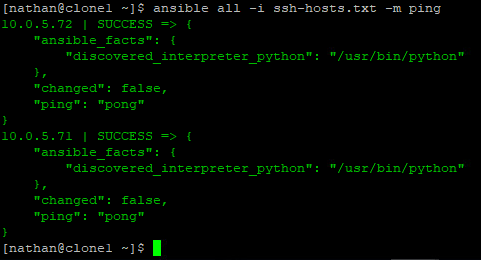2.2 KiB
2.2 KiB
| description |
|---|
| In this lab, we set up the clone machines, configured SSH to use RSA keys as authentication, and used PSSH and Ansible to automate commands |
Lab12 - Automation
Configure clone1, clone2, and clone3
For all three machines...
- Change network adapter to LAN
nmtui- Manual IP address
- 10.0.5.70/24
- 10.0.5.71/24
- 10.0.5.72/24
- Gateway 10.0.5.2
- DNS 10.0.5.6 & 8.8.8.8
- Search domain: nathan.local
- Manual IP address
systemctl restart networkuser add nathan && passwd nathanusermod -aG wheel nathan- Add DNS records to AD02
Configuring SSH
Creating RSA key pair for SSH
ssh-keygen- Default location
- enter a passphrase
ssh-copy-id nathan@clone2ssh-copy-id nathan@clone3

Add passwordless SSH login (for 1 hour)
eval `ssh-agent`ssh-add -t 1h- This is not permanent, you have to retype these commands every session
Allow passwordless elevation to root by wheel group members
- On clone2 and clone3, uncomment this line in /etc/sudoers

PSSH - Parallel SSH.
-
Allows you to run SSH commands on multiple hosts
-
On clone1
yum install epel-releaseyum install pssh- create a text file called ssh-hosts.txt and add IP addresses of clone2 and clone3

- make sure passwordless SSH is enabled
pssh -i -h ssh-hosts.txt -- <command>-i- interactive - show command output

install Ansible
-
On clone1
sudo yum install ansibleansible all -i ssh-hosts.txt -m ping

-b- tells Ansible that the user associated with the SSH public key at the other end of the connection is a sudoer user
